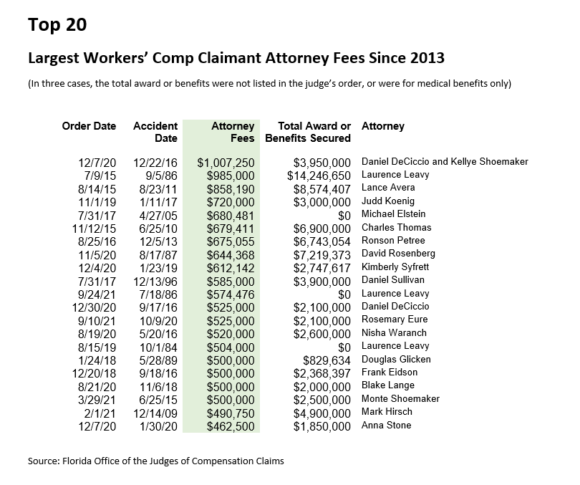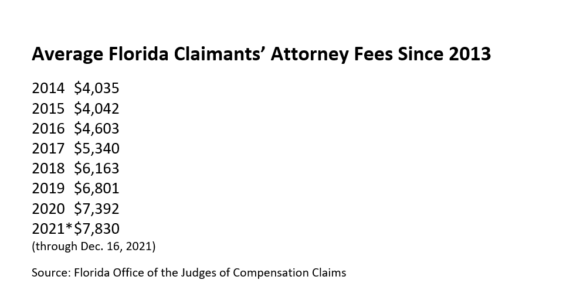Few things in Florida workers’ compensation have been a bigger issue over the last decade than claimants’ attorneys’ fees. Despite two landmark appeals court rulings barring limits on fees, employers and insurers have continued to cite the need for new legislation.
A recent settlement, approved by an Orlando-based judge of compensation claims, could give new voice to those who want fee restraints. The settlement came in December 2020, but only this month caught the attention of some in the workers’ comp community.
In the case of a catastrophically brain-injured worker named Esdras Ambrocio, the settlement granted a near-record amount of fees – more than $1 million on a $3.9 million total award. The fee was split between two claimants’ attorneys. For one, the payment would translate to an eye-popping $9,100 per hour.
The fee is just over 25% of the total settlement amount and is well above what’s recommended by the fee guidelines in state law, insurance attorneys complained.
“I find it mildly outrageous,” one workers’ comp defense attorney said. “There was minimal litigation involved in this case, it looks like.”
Million-dollar attorney fees in comp cases are rare, but not unheard of. Some are the result of decades of work. What makes this one stand out is that it covered just five years of legal work, with a relatively small amount of hours invested. Even some claimants’ attorneys were surprised.
“That’s a big fee for five years of work,” said Laurence Leavy, a Fort Lauderdale comp attorney who has received a number of large fees – but most of them for cases that were litigated over 30 years or more.
A former Florida judge noted that the Ambrocio settlement was “perfectly legal” and was something the guardian for the injured worker had agreed to.
“But when the Florida Legislature sees $9,000 an hour, and it’s coming out of the claimant’s award, someone will get fired up about that,” the judge said.
The case began in 2016, when the then-26-year-old Ambrocio fell from a roof while installing trusses. He struck his head, suffered a serious brain injury and now requires constant care, according to court records. The employer was Hasan Heosig and the insurer was Granite State Insurance and AIG Claims Inc. The settlement will be paid in part through an annuity.
An affidavit filed in the case shows that one of Ambrocio’s lawyers, Winter Park comp attorney Daniel DeCiccio, reported 54.8 hours of work on the case. His half of the fee comes to $503,625, which translates to about $9,190 per hour. Kellye Shoemaker, of Altamonte Springs, reported 168.35 hours, or about $2,991 per hour.
DeCiccio and Shoemaker could not be reached for comment for this article. But in the affidavit that explains the basis for the fee, DeCiccio explained that the difficulty and complexity of the case, along with the skill level of the claimant’s lawyers, warrant the large dollar amount. DeCiccio specializes in traumatic brain injury cases.
DeCiccio noted that Ambrocio needed the millions so that he can move out of an assisted living facility and have more independence – with the help of personal health care attendants. Without DeCiccio’s and Shoemaker’s help, Ambrocio would have been as “helpless as a turtle on its back,” DeCiccio wrote.
“I find that the requested attorney’s fee is reasonable,” Compensation Judge Thomas Sculco wrote in his order approving the settlement and fees. “I further find that because the claimant has agreed to pay an enhanced attorney’s fee in accordance with a retainer agreement and waiver, the requested fee complies with the decision in Miles v. City of Edgewater Police Department.”
The Miles decision, by Florida’s 1st District Court of Appeal in 2016, essentially held that claimants and, in the Miles case, the worker’s labor union, may contract with their attorneys to set legal fees. A state law that had attempted to restrict that practice deprived plaintiffs of their constitutional right to free speech, the court found.
Also that year, the Florida Supreme Court decided in Castellanos vs. Next Door Co. that a sliding-scale statutory fee schedule that capped claimants’ attorney fees was unconstitutional.
 Before those court rulings, some claimants’ attorneys noted that they could spend many hours on a claim and end up with a relatively small settlement – and a tiny legal fee. The Florida workers’ comp statute had limited attorney fees to 20% of the first $5,000 of benefits secured and 15% of the next $5,000. On benefits that accrue after 10 years, the fee was limited to 5%.
Before those court rulings, some claimants’ attorneys noted that they could spend many hours on a claim and end up with a relatively small settlement – and a tiny legal fee. The Florida workers’ comp statute had limited attorney fees to 20% of the first $5,000 of benefits secured and 15% of the next $5,000. On benefits that accrue after 10 years, the fee was limited to 5%.
On a $10,000 benefits award, for example, the fee schedule limited a worker’s attorney to just $1,750, even though he or she may have worked 100 hours on the case. A defense attorney, paid by the hour, would often stand to earn much more for the same amount of work.
Part of the legislative reasoning behind the fee limits, besides tamping down workers’ comp costs for businesses, was that in many cases, the fee would come out of the claimant’s indemnity award, potentially depriving injured workers of some indemnity compensation. And unlike personal injury cases, in which lawyers often charge 30% to 40% of the award, comp cases can’t include punitive damages paid directly by the defendant corporation or insurer.
But the statutory fee limits were scaring attorneys away from the workers’ comp area of the law and were making it difficult for injured workers to find representation, claimants’ lawyers argued.
Since the Castellanos decision, claimants’ attorneys are not limited by the fee schedule. But insurance attorneys said that most claimants’ lawyers continue to use the schedule as a guide or they follow a simple rule of thumb: 10% of the settlement or award, plus $750. If the parties and the judge in the Ambrocio case had followed that rule, the claimant’s attorneys’ fees would have totaled $395,750.
Florida comp defense lawyers declined to comment on the record for this article because they said they must work regularly with the claimant’s attorneys and the judge in the case.
But some said, without attribution, that the Ambrocio case marks a dangerous precedent. Insurers and employers have fretted that claimants’ legal fees have been creeping upwards since the Castellanos decision, adding to carriers’ loss adjustment expenses and threatening to affect comp insurance premiums. The Ambrocio fees appear to underscore those concerns.
Claimants’ lawyers have countered that workers’ comp premiums for most employers in Florida have dropped significantly in recent years, suggesting that plaintiffs’ legal fees aren’t hurting anyone. After regulators approved a 14.5% average rate increase for 2017, due to the anticipated effects of the Castellanos court ruling, rates since then have fallen by more than 40%. This month, the Florida Office of Insurance Regulation approved another average decrease in comp rates, of 4.9%, for 2022. Florida’s premiums rank about in the middle of the pack among U.S. states, according to one study.
Besides, claimants’ lawyers said, the Ambrocio fee package was part of a contract agreement between the plaintiff and his lawyers, not something that an insurance company has any control over. Carriers pay claimants’ attorney fees in about a quarter of litigated claims, usually when the claim is denied or is not paid in a timely manner.

“This is not an issue that insurance attorneys should be clutching their pearls about,” said Geoff Bichler, an Orlando claimants’ attorney who was one of the lead lawyers in the Miles case. “This is not something they need to worry about. No one’s talking about their hourly rates and them defending so many baseless claims denials and driving up litigation to a ridiculous level just to pad their own payroll.”
Data from the Florida Division of Administrative Hearings, which houses the Office of the Judges of Compensation Claims, show that the Ambrocio fee was the largest since at least 2013. The next-largest fee, for $985,000, came in 2015, and was the result of protracted medical care and litigation resulting from a 1986 injury.
In that case, the benefits secured were more than $14 million, making the legal fees less than 7% of the total award, and about $140 per hour. And the fees covered more than 7,000 hours of legal work over 30 years, which the insurer had not paid through the years, said Leavy, the well-known Fort Lauderdale claimants’ attorney in the case.
Leavy warned, though, that in cases involving a limited number of hours, a massive attorney fee can put the claimants’ bar in a bad light and may lead to a backlash.
“That’s a problem,” Leavy said.
The OJCC data show and attorneys on both sides of the divide say that some Florida claimants’ lawyers now routinely charge a 25% contingency fee on the injured worker’s total award – something that was almost unheard of before the Miles and Castellanos decisions.
The database, covering more than 258,000 claims since 2013, also shows that since the Castellanos decision, claimants’ attorney fees have risen steadily. The total amount of claimants’ attorney fees per year have climbed from $128 million in 2014 to $230 million in 2021. The average amount of fees, after remaining steady at about $4,000 in 2014 and 2015, also has risen each year, topping $7,830 in 2021.
That’s a 94% increase, about five times the rate of inflation.
Claimants’ lawyers said the increases have been needed and reflect the vast amount of work that some comp cases require.
“There’s no way we can take cases for a 10% fee and stay in business,” Bichler, the Orlando claimants’ attorney, said. “It’s just too expensive and cases are too complicated.”
For many in the Florida workers’ comp arena, the Ambrocio fees bring to mind the famous, 1987 Sitko case, in which $1.75 million in attorneys’ fees were awarded. In What an Idea vs. Sitko, the appeals court upheld the compensation judge’s order, despite arguments from insurers that the fees were excessive, at about $3,000 an hour. The $1.75 million in fees were on $17.6 million in benefits secured, or about 10% of the award. Those fees would be about $4.2 million in today’s dollars.
That court decision outraged many and may have played a role in the Legislature restricting some worker benefits and adopting the sliding-scale fee schedule in the 1990s, the schedule that the Castellanos decision ultimately struck down, attorneys said.
It’s uncertain if Florida lawmakers will now take action on attorney fees in the legislative session that begins Jan. 11. Some legislators have said the capital will be preoccupied with election redistricting and perhaps further adjustments to property insurance reforms.
State Sen. Keith Perry, R-Gainesville, the owner of a roofing company who has long worked to reduce comp costs, has no plans to sponsor any attorney fee bills this year, his chief of staff said. Perry introduced a measure in 2019 that would have required claimants’ attorneys to detail the amount of time they have spent on a case, before a hearing is held, and would have limited some comp benefits.
That bill died in committee.
Claimants’ lawyers have their own ideas on ways to limit litigation costs. One idea is to remove the section of the comp statute that requires comp judges to review legal fees. State law does not require judicial oversight on fees in most other types of litigation, Bichler said. Ending the requirement in comp would save a significant amount of document filing and attorneys’ time, on both sides of the fence, he said.
Another idea, Leavy suggested, would be for insurance carriers to concede claimants’ attorney fees early on, before fees end up in dispute and protracted litigation. Claimants’ firms could also buck the recent trend toward larger contingency fees. While some firms now demand 25% of the total, lifetime award, Leavy urged his fellow lawyers to avoid the appearance of greed and stick closer to the statutory guidelines, which reduce the amount of fees on those benefits that accrue after 10 years.
Topics Florida
Was this article valuable?
Here are more articles you may enjoy.



 Florida Senate President Says No Major Insurance Changes This Year
Florida Senate President Says No Major Insurance Changes This Year  What Analysts Are Saying About the 2026 P/C Insurance Market
What Analysts Are Saying About the 2026 P/C Insurance Market  Florida’s Commercial Clearinghouse Bill Stirring Up Concerns for Brokers, Regulators
Florida’s Commercial Clearinghouse Bill Stirring Up Concerns for Brokers, Regulators  Winter Storm Fern to Cause Up to $6.7B in Insured Losses
Winter Storm Fern to Cause Up to $6.7B in Insured Losses 


